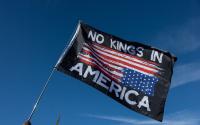24 January 2004
Senator John Kerry has taken the lead nationally among Democrats and Democratic-leaning voters over Vermont Gov. Howard Dean in the race for the Democratic nomination, according to the latest Newsweek Poll. Kerry leads the field with 30 percent, followed by Sen. John Edwards with 13 percent. Howard Dean falls to 12 percent from 24 percent in the last Newsweek Poll two weeks ago, and is even with General Wesley Clark, also at 12 percent. Kerry also leads the pack of Democratic contenders among registered voters as the candidate who would have a better chance of beating President George W. Bush if the election were held today. A Kerry-Bush match-up would have Kerry up by 49 percent to Bush's 46 percent. A Clark and Bush match-up would be a close race, with Bush at 48 percent and Clark at 47 percent. Bush would have an edge over Edwards (49% to 46%). Yet, with a plus or minus margin of error, these match-ups result in a statistical dead heat. And the President would beat Dean (50% to 45%) and Sen. Joe Lieberman (49% to 45%).
And Democrats and Democratic leaners also think Sen. John Kerry has the best chance (48%) of defeating Bush in November, and is the candidate mostly likely to do so (43%). Howard Dean follows at 26 percent (a drop from 38% in the 12/11-12/03 Newsweek Poll). Only 15 percent think Dean would most likely defeat Bush. In third is Wesley Clark at 23 percent, and John Edwards at 22 percent. Only 14 percent say Joe Lieberman has a good chance of beating George Bush.
And more registered voters (54%) and Democrats and Democratic leaners (74%) have a favorable opinion of Kerry followed by Lieberman with 48 percent of registered voters, but only 56 percent of Democrats and Democratic leaners. Edwards follows with 60 percent of Democrats and Democratic leaners, but only 46 percent of registered voters. However, 42 percent of registered voters have an unfavorable opinion of Howard Dean, though a 57-percent majority of Democrats and Democratic leaners has a favorable opinion of the Vermont Governor.
And the combination of Democrats considered the best ticket to beat Bush in November among Democrats and Democratic leaners would be Kerry-Edwards or Kerry-Clark, both at 21 percent, followed by Kerry-Dean (19%).
Meanwhile, a week after President Bush's State of the Union address, his approval rating has fallen to 50 percent from 54 percent in the last Newsweek Poll (1/8-9/04). Yet, a 52-percent majority of registered voters says it would not like to see him re-elected to a second term. Only 44 percent say they would like to see him re-elected, a four-point drop from the last Newsweek Poll. (Of that, 37% strongly want to see him re-elected, and 47% strongly do not). However, a large majority of voters (78%) says that it is very likely (40%) or somewhat likely (38%) that Bush will in fact be re- elected to a second term in office. Only 10 percent believe it is not too likely or not at all likely (10%).
With 52 percent of registered voters saying they are dissatisfied with the way things are going in the U.S. this year, the issues that are very important in helping them determine who they will vote for are: the economy and jobs (83%); health care (75%) and education (74%); the situation in Iraq and terrorism and homeland security (70%). The least important is the appointing of new Supreme Court justices and federal judges (42%).
A 53-percent majority of Democrats and Democratic leaners say they are more inclined to vote for the candidate who comes closest to their way of thinking on the issues rather than the candidate with the best chance of defeating President Bush (39%). And the large majority (71%), says it's very important that the Democratic presidential nominee has clear-cut alternatives to Bush on issues like Iraq and taxes; can attract young people and other first-time voters to turn out and support the Democratic ticket (70%); understands the concerns of working families because he grew up in one (64%); has foreign policy and national defense experience (56%), and comes across as even-tempered and appeals to voters in the South (54%).
For this Newsweek Poll, Princeton Survey Research Associates International interviewed 1,006 adults aged 18 and older on January 22-23, 2004. The margin of error is plus or minus 3 percentage points. This poll is part of the February 2 issue of Newsweek (on newsstands Monday, January 26).
http://www.commondreams.org/cgi-bin/newsprint.cgi?file=/news2004/0124-10.htm






